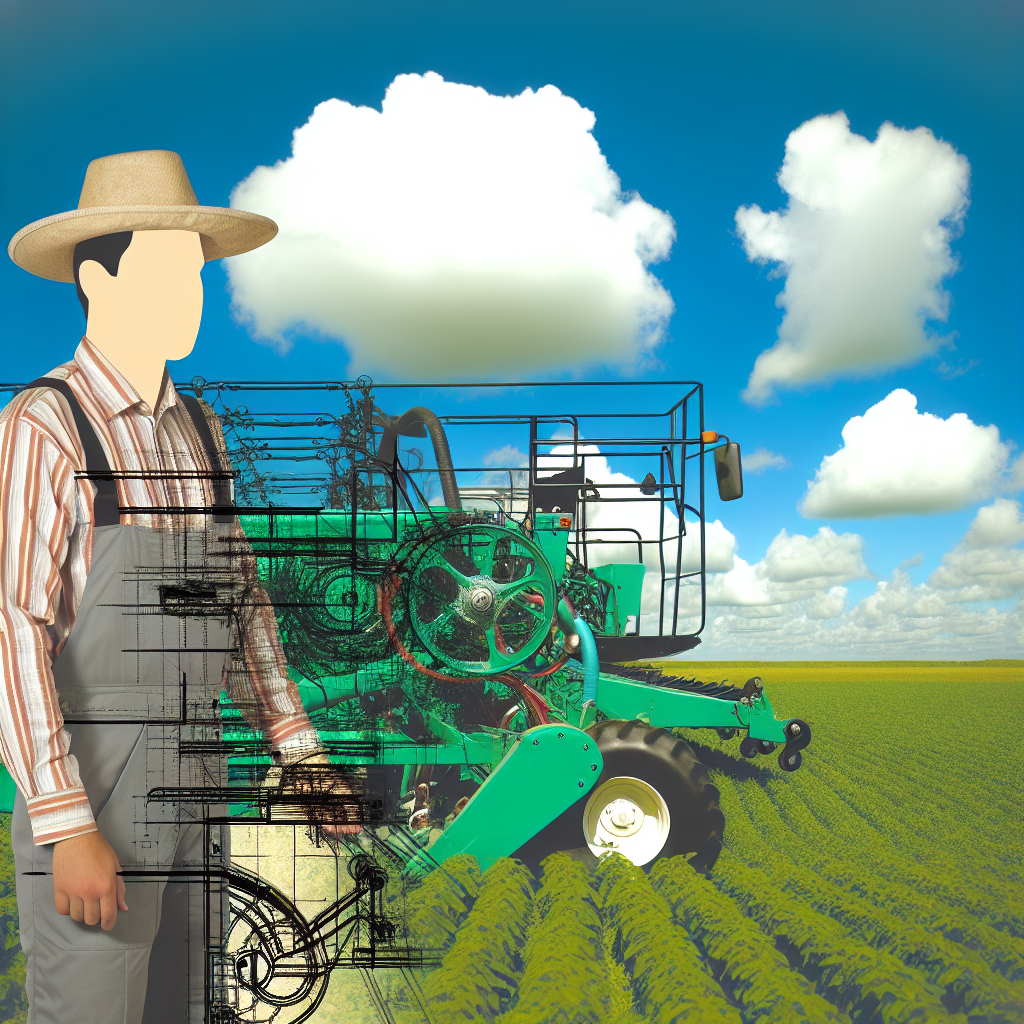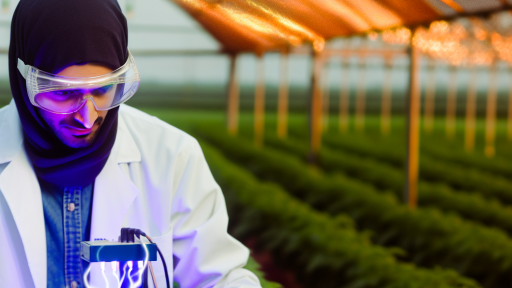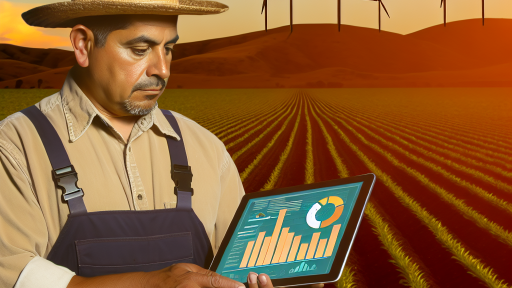Introduction to Automated Machinery in Organic Farming
The agricultural landscape is continuously evolving.
Automated machinery play a significant role in this transformation.
These advancements greatly enhance organic farming practices.
They minimize labor while maximizing efficiency.
Understanding Automated Machinery
Automated machinery refers to equipment that performs tasks with minimal human intervention.
These tools range from robotic harvesters to automated irrigation systems.
They integrate innovative technologies like AI and machine learning.
This integration improves crop management and resource allocation.
Benefits of Automation in Organic Farming
Automation offers numerous advantages for organic farming.
- It reduces labor costs significantly.
- Automation enhances precision in planting and harvesting.
- This technology minimizes waste and conserves resources.
- It improves overall crop yield and quality.
Challenges in Implementing Automated Machinery
Adopting automated machinery is not without its challenges.
High initial investment costs can be a barrier for some farmers.
Additionally, there may be a learning curve associated with new technologies.
Farmers must also consider the maintenance of these machines.
The Future of Automation in Organic Farming
The future looks promising for automated machinery in organic farming.
As technology continues to advance, new solutions will emerge.
Transform Your Agribusiness
Unlock your farm's potential with expert advice tailored to your needs. Get actionable steps that drive real results.
Get StartedFarmers are likely to see improvements in efficiency and sustainability.
Automation will support the growth of organic practices.
Benefits of Using Automated Machinery in Organic Farming Practices
Increased Efficiency
Automated machinery significantly increases operational efficiency in organic farming.
Farmers can manage larger areas with reduced labor input.
This efficiency leads to increased crop yields and lower production costs.
Improved Precision
Automation enhances precision in tasks like planting and irrigation.
Machines apply seeds at optimal depths and spacing for growth.
Additionally, precision irrigation techniques reduce water waste.
Labor Savings
Automated systems reduce reliance on manual labor significantly.
This reduction helps mitigate labor shortages faced by many farms.
Farmers can allocate human resources to other areas requiring attention.
Enhanced Sustainability
Using automated machinery supports sustainable farming methods.
Machines can operate with minimal environmental disruption.
These practices maintain soil health and biodiversity effectively.
Access to Data and Technology
Automated farming machinery often comes equipped with data analytics tools.
Farmers can monitor crop health and soil conditions in real-time.
This data-driven approach enables informed decision-making and planning.
Reduction of Labor-Intensive Tasks
Automation takes over repetitive and labor-intensive tasks.
This shift allows farmers to focus on strategy and management.
Consequently, farms operate more smoothly and efficiently.
Cost-Effectiveness Over Time
While initial investments in machinery can be high, costs decrease over time.
Automated systems lead to savings through reduced labor and increased yields.
Farmers can eventually recoup their investments and improve profitability.
Types of Automated Machinery Available for Organic Farming
Soil Preparation Equipment
Automated tillers efficiently prepare the soil for planting.
Showcase Your Farming Business
Publish your professional farming services profile on our blog for a one-time fee of $200 and reach a dedicated audience of farmers and agribusiness owners.
Publish Your ProfileThese machines reduce compaction and enhance soil health.
Additionally, they support organic practices by minimizing disturbance.
Seeding and Planting Machinery
Precision seeders ensure accurate planting depth and spacing.
This equipment optimizes crop yields while conserving seeds.
Using automated planters facilitates uniform germination across fields.
Irrigation Systems
Automated irrigation systems manage water flow effectively.
These systems utilize sensors to monitor soil moisture levels.
Moreover, they reduce water waste and promote sustainable usage.
Pest and Weed Control Solutions
Autonomous weeders autonomously identify and remove weeds.
This technology minimizes the need for chemical herbicides.
Integrating drones for pest management enhances monitoring capabilities.
Harvesting Equipment
Automated harvesters significantly speed up the harvesting process.
They operate efficiently, minimizing crop losses during harvest.
Furthermore, these machines reduce labor costs on farms.
Monitoring and Analytics Tools
Data collection tools track crop health and growth indicators.
Farmers can analyze this data to improve decision-making.
Using drones for aerial surveying provides an overview of fields.
Explore Further: Optimizing Space Utilization with Vertical Farming Tech
Integration of Technology: How Automated Systems Improve Efficiency
Enhanced Precision in Farming
Automated machinery allows for precise planting and harvesting.
This precision minimizes seed waste and increases yield efficiency.
Moreover, it ensures that crops receive optimal care throughout their growth stages.
Reduction in Labor Requirements
Automation significantly reduces manual labor needs in farming.
This shift allows farmers to allocate their workforce to more critical tasks.
Consequently, it enhances overall productivity on the farm.
Improvement in Data Management
Automated systems collect vast amounts of data effortlessly.
Farmers can analyze this data to make informed decisions.
This capability helps in identifying trends and improving crop management strategies.
Consistent Monitoring of Conditions
Automated sensors monitor soil and crop conditions constantly.
These sensors provide real-time feedback on moisture and nutrient levels.
As a result, farmers can make timely decisions to optimize crop health.
Integration of Cutting-Edge Technology
Modern farming integrates advanced technologies like IoT and AI.
These technologies enhance operational efficiency and minimize resources used.
Using AI, farmers can predict crop yields and optimize inputs accordingly.
Sustainability through Automation
Automated systems contribute to sustainable farming practices.
They help reduce pesticide and fertilizer use by applying them precisely.
This reduction minimizes environmental impact and promotes soil health.
See Related Content: Data Analytics Tools Every Farmer Should Use
Case Studies: Successful Implementations of Automation in Organic Farms
Introduction to Automation in Organic Farming
Automation plays a vital role in modern organic farming.
It increases efficiency and reduces labor costs.
Many farms have successfully integrated automated machinery.
Showcase Your Farming Business
Publish your professional farming services profile on our blog for a one-time fee of $200 and reach a dedicated audience of farmers and agribusiness owners.
Publish Your ProfileLet’s explore some real-world examples.
Green Acres Farm: Integrating Robotic Harvesters
Green Acres Farm, located in Oregon, adopted robotic harvesters.
This shift significantly improved their berry picking efficiency.
Before automation, seasonal labor shortages hindered productivity.
Now, robots handle the harvesting during peak seasons.
This change has resulted in increased yield and reduced waste.
Technology and Results
The farm uses AI-powered robots designed for berry harvesting.
These machines efficiently identify ripe berries while minimizing damage.
As a result, Green Acres boosted its annual profits by 25%.
Sunny Fields: Automated Irrigation Systems
Sunny Fields, a vegetable farm in California, implemented automated irrigation systems.
They use moisture sensors to regulate water usage.
Consequently, this practice conserves water and enhances crop health.
Farmers have reported a 15% reduction in water consumption.
Now, crops receive optimal hydration without overwatering.
Impact on Sustainability
Sunny Fields’ automation practice supports sustainable farming.
Reduced water usage contributes to environmental conservation.
Moreover, healthier crops lead to higher quality produce.
Harvest Time Organics: Drones for Crop Monitoring
Harvest Time Organics, based in Florida, uses drones for crop monitoring.
Drones capture high-resolution images to assess plant health.
This technology allows farmers to identify issues quickly.
As a result, they can address diseases or pests rapidly.
The farm has reduced pesticide usage by 30% due to precise monitoring.
Benefits of Drone Technology
Drones offer a comprehensive view of large fields efficiently.
They enable targeted interventions rather than blanket treatments.
This approach enhances organic farming practices while protecting ecosystems.
Sustainable Solutions: Autonomous Weeding Machines
Sustainable Solutions, a herb and spice farm, utilizes autonomous weeding machines.
These machines eliminate weeds without disturbing soil health.
By reducing herbicide use, they align with organic farming principles.
Farmers appreciate the labor savings and decreased chemical dependency.
Results Achieved
Since implementing this technology, the farm reported 40% less weed-related damage.
Additionally, the reduced need for manual weeding has lowered labor costs.
This innovation promotes both efficiency and sustainability.
Future Directions in Organic Farming Automation
These case studies illustrate the successful integration of automation in organic farming.
Automation enhances productivity while supporting sustainable practices.
As technology continues to evolve, more farms will likely follow suit.
Explore Further: Precision Agriculture: Improving Soil Health and Productivity

Challenges and Limitations of Automated Machinery in Organic Farming
Understanding the Unique Needs of Organic Farming
Organic farming prioritizes natural processes and sustainability.
This approach often contrasts with standard agricultural practices.
As a result, automated machinery may not cater to organic requirements.
High Initial Costs
The purchase price for automated equipment can be prohibitive.
Showcase Your Farming Business
Publish your professional farming services profile on our blog for a one-time fee of $200 and reach a dedicated audience of farmers and agribusiness owners.
Publish Your ProfileMany organic farmers operate on limited budgets.
This makes it difficult for them to invest in advanced technology.
Maintenance and Repair Issues
Automated machinery requires regular maintenance and repairs.
For many small-scale farms, this can be a significant burden.
Accessing qualified technicians often proves challenging.
This leads to increased downtime and decreased productivity.
Compatibility with Organic Practices
Some automated machinery uses chemicals or synthetic materials.
This conflicts with organic farming principles.
Farmers must ensure all equipment aligns with organic standards.
This can limit the choices of machinery available.
Training and Skill Gaps
Using automated machinery requires specialized knowledge and skills.
Many organic farmers may lack the necessary training.
This gap can hinder effective utilization of technology.
Consequently, the investment in automation may not yield expected benefits.
Environmental Concerns
Automated machinery can impact soil health and biodiversity.
High-tech equipment might disrupt natural habitats.
Farmers must balance technology use with ecological responsibility.
Resistance to Change
Many organic farmers trust traditional farming methods.
They may hesitate to adopt new technologies.
This resistance can stall the integration of automation.
Discover More: Remote Sensing Technologies for Organic Farmers
Future Trends: Innovations in Agricultural Technology for Organic Practices
Advancements in Automation
Automation transforms organic farming methodologies significantly.
Farmers increasingly adopt robotic systems for planting and harvesting.
These innovations reduce labor costs while enhancing efficiency.
Furthermore, automated machines improve precision in crop management.
Data-Driven Agriculture
Farmers utilize data analytics to optimize their farming operations.
This approach allows for informed decisions based on real-time data.
Integrating sensors into farming practices enhances soil management.
Additionally, data collection improves pest and disease monitoring.
Sustainable Practices through Technology
Technological innovations promote more sustainable farming practices.
Farmers adopt eco-friendly machinery to minimize environmental impact.
For example, electric tractors reduce emissions significantly.
Moreover, innovations in irrigation technology conserve water effectively.
Precision Agriculture Techniques
Precision agriculture leverages technology for targeted interventions.
Farmers apply nutrients and pesticides more accurately than ever.
This method results in reduced chemical use and safer produce.
Farmers using drones can identify crop health issues swiftly.
Collaborative Platforms for Farmers
Technology facilitates collaboration among organic farmers.
Online platforms allow sharing of resources, knowledge, and best practices.
Farmers can access educational resources on organic techniques easily.
Showcase Your Farming Business
Publish your professional farming services profile on our blog for a one-time fee of $200 and reach a dedicated audience of farmers and agribusiness owners.
Publish Your ProfileFurthermore, community support strengthens the organic farming network.
Best Practices for Selecting and Implementing Automated Machinery in Organic Farming
Identifying Your Needs
First, evaluate your specific farming needs.
Consider the scale and type of your crops.
Next, assess the tasks you want to automate.
For instance, think about planting, weeding, or harvesting.
Moreover, analyze the terrain and soil conditions.
They influence the choice of machinery significantly.
Research Available Options
Conduct thorough research on available automated machinery.
Look for models designed for organic farming practices.
Check for reviews and testimonials from other farmers.
This will provide insights into their performance.
Additionally, compare features, specifications, and prices.
Ensure the machinery meets both current and future needs.
Consulting Experts
Engage with agricultural experts or consultants.
They can provide valuable advice based on your specifics.
Utilize their expertise to understand equipment compatibility.
Furthermore, seek recommendations from experienced organic farmers.
Their insights can guide you through the selection process.
Assessing Sustainability and Compliance
Verify that the machinery complies with organic standards.
It should not use synthetic products or cause soil damage.
Consider machinery that enhances sustainability practices.
For example, look for energy-efficient or renewable-powered options.
Sustainability should be a core criterion in your decision-making.
Testing Before Purchase
Whenever possible, test machinery before committing to a purchase.
This will help assess its usability in your farming environment.
Consider renting equipment for a trial period.
Doing so allows you to identify potential issues upfront.
Additionally, assess how well it integrates into your workflow.
Training and Support
Ensure adequate training is available for you and your staff.
Proper training maximizes the effective use of the machinery.
Inquire about ongoing support from the manufacturers.
Reliable support can assist with maintenance and troubleshooting.
Establish a relationship with local technicians for repairs.
Monitoring Performance
After implementation, continually monitor machinery performance.
Collect data on efficiency, downtime, and maintenance needs.
This analysis helps identify areas for improvement.
Moreover, stay open to adapting your practices over time.
Adjustment based on performance data can enhance productivity.
Staying Informed about Innovations
Stay informed about advancements in agricultural technology.
New machines may offer features that improve efficiency.
Showcase Your Farming Business
Publish your professional farming services profile on our blog for a one-time fee of $200 and reach a dedicated audience of farmers and agribusiness owners.
Publish Your ProfileAttend agricultural trade shows and workshops.
Networking at these events can lead to valuable connections.
Moreover, subscribe to industry publications and forums.
They provide updates on trends and innovations regularly.
Additional Resources
Precision Agriculture: Benefits and Challenges for Technology …




